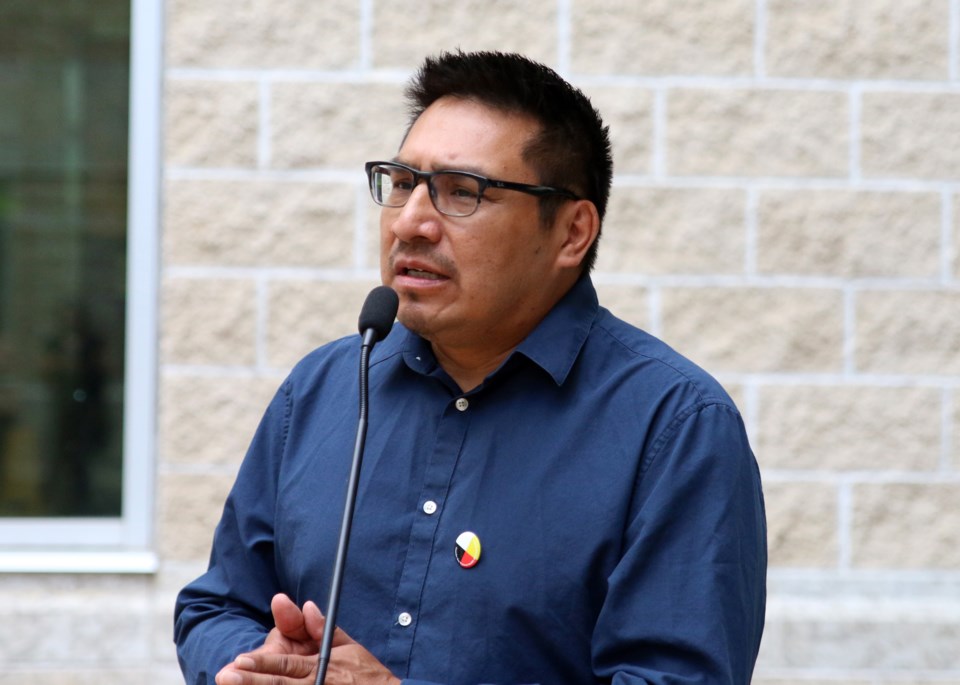The ongoing discovery of undocumented deaths connected to Canada’s residential school system should be a humbling moment for leaders across the country, and a call for real change, says Kiiwetinoong MPP Sol Mamakwa.
The news of an estimated 751 bodies discovered in a cemetery near the former Marieval Indian Residential School, announced Thursday by the Cowessess First Nation in Saskatchewan, offered devastating confirmation of what Indigenous people had long known, he said.
“For a long time, this is what survivors, family members have always said… but nobody believed them,” Mamakwa said. “I think it’s so important, these truth-telling stories are [what] we need to be able to move forward and come together.”
More recently, the fact there were unreported gravesites connected to residential schools was clearly set out in the 2015 final report of Canada’s Truth and Reconciliation Commission (TRC).
Both the Cowessess discovery and the estimated 215 children found in unmarked graves at the Kamloops Indian Residential School in May came through the use of ground-penetrating radar.
Cowessess Chief Cadmus Delorme called the discovery preliminary, and noted it was not immediately clear whether all the remains were connected to the residential school.
The discoveries have prompted Indigenous communities across the country, including Fort William First Nation, to plan their own investigations of former residential schools, sanatoriums, and other sites.
Communities have been trying to find lost relatives for years, before the recent discoveries turned public attention to the issue, Mamakwa said. It still stung to know that Canadian society hadn’t previously supported those efforts, he said.
SEE RELATED: 'We were innocent children ... separated by force from our homes'
The New Democrat MPP, who is the sole Indigenous representative at Queen’s Park, recalled travelling to Peawanuck in 2011 for the repatriation of Charlie Hunter, who died at the St. Anne’s residential school in Fort Albany in 1974 at 13, and was buried there without permission from his family.
The federal government refused to assist with the repatriation process, the Toronto Star reported.
“What was disgusting is that it wasn’t paid for by the government,” said Mamakwa. “It was paid by donations from the people of Toronto. When I think about what’s happening, I see that on repeat, hundreds of times.”
It’s crucial governments now offer full support to the process of investigation, repatriation, and other steps deemed necessary by communities, he said.
He called into question the limited dollar figures assigned to the task by provincial and federal governments, including a $10 million commitment over three years from Ontario.
SEE RELATED: Chief cautions careful approach to residential school burial site investigation
It’s not only governments who need to step up, though – “It’s the churches too,” Mamakwa said.
Delorme suggested grave markers might have been removed by the Catholic Church, which operated the cemetery at Marieval.
“The 751 unmarked graves that they’ve found, there are no names attached to them,” Mamakwa said. “We need those [church] records to be able to determine who they are and bring them home, but also how they died. The archival documents are so, so important to be able to find out the real history.”
The MPP convened an Indigenous group with expertise in archaeology and forensic pathology to offer guidance, and intends to provide that advice to Indigenous communities and the government, he said.
Mamakwa called on leaders to move beyond sympathy to systemic change.
“It’s good to send prayers and thoughts, but we need meaningful action,” he said. “It’s really important… to put resources toward implementing the 94 calls to action from the TRC.”
The provincial government’s 2018 decision to cancel plans to expand the Indigenous school curriculum was one example of ongoing failures hidden behind statements of support, Mamakwa said.
Cancelled curriculum development sessions would have included consultation with residential school survivors about how the subject should be taught.
Of more than 150,000 Indigenous children estimated to have attended the institutions, the Truth and Reconciliation Commission identified 3,200 confirmed student deaths, a rate it found to be much higher than in the non-Indigenous population.
That was without taking into account the unknown number of undocumented deaths now being investigated.
The TRC’s final report found residential schools often didn’t send the bodies of students home, and sometimes didn’t inform families or even record the names of the children.
The TRC requested additional funding to investigate residential school deaths in 2009, but was turned down by the federal government.
A 24-hour national residential school crisis line is available at 1-866-925-4419.



